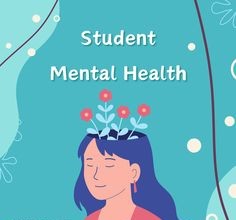Introduction
Mental wellness plays a crucial role in students’ academic and personal lives. The pressures of exams, assignments, social expectations, and future career planning can significantly impact their mental health. When students prioritize their mental well-being, they enhance their ability to focus, learn, and grow. In this article, we will explore the importance of mental health for students, its impact on academic performance, strategies to maintain mental wellness, and how parents and teachers can provide support.
Why Mental Wellness is Essential for Students
1. Enhances Academic Performance
Students who prioritize their mental wellness tend to perform better academically, as a healthy mind enhances focus, concentration, and memory retention. On the other hand, excessive stress and anxiety can interfere with learning, making it challenging to absorb and recall information. When students actively take care of their mental wellness through proper rest, mindfulness practices, and a balanced routine, they experience improved cognitive function. This not only helps them grasp complex concepts more effectively but also boosts problem-solving skills and creativity, leading to overall academic success. Furthermore, maintaining good mental wellness fosters resilience, enabling students to handle academic pressures with confidence and clarity.
2. Improves Emotional Stability
Students face various emotional challenges, such as peer pressure, self-esteem issues, and family problems. Maintaining mental wellness helps them regulate their emotions, cope with challenges, and develop resilience.
3. Builds Healthy Relationships
Good mental health allows students to communicate effectively, develop empathy, and build positive relationships with peers, teachers, and family members. It also reduces social anxiety and loneliness.
4. Promotes Better Decision-Making
When students are mentally well, they make better decisions regarding their education, career, and personal lives. A clear and focused mind helps them evaluate situations rationally and make informed choices.
Common Mental Health Challenges Faced by Students
1. Academic Pressure
The need to excel in studies, score high grades, and secure a good future can lead to stress and anxiety among students. High expectations from parents and teachers add to this pressure.
2. Social Anxiety
Many students struggle with confidence in social situations. Fear of judgment, difficulty in making friends, and self-esteem issues can lead to isolation and loneliness.
3. Depression and Anxiety
The competitive nature of education, combined with personal struggles, can contribute to depression and anxiety. Symptoms include sadness, lack of motivation, excessive worry, and fatigue.
4. Lack of Sleep
Late-night study sessions, excessive screen time, and overthinking can disturb students’ sleep patterns, leading to fatigue, irritability, and difficulty concentrating.
5. Bullying and Peer Pressure
Bullying and peer pressure can significantly impact a student’s self-confidence and mental wellness. The fear of being excluded or judged leads to stress and emotional distress.
How to Maintain Mental Wellness as a Student

1. Practice Time Management
- Create a study schedule to avoid last-minute stress.
- Prioritize tasks and break them into manageable parts.
- Take regular breaks while studying to refresh the mind.
2. Engage in Physical Activities
- Exercise regularly to reduce stress and boost mood.
- Participate in sports, yoga, or simple physical exercises.
- Spend time outdoors to rejuvenate the mind.
3. Maintain a Healthy Lifestyle

-
Maintaining a healthy lifestyle is essential for students as it directly impacts their mental wellness and academic performance. A balanced routine that includes proper nutrition, regular physical activity, adequate sleep, and stress management plays a vital role in overall well-being.
1. Eat a Nutritious Diet
A well-balanced diet fuels both the body and mind. Consuming nutrient-rich foods like fruits, vegetables, whole grains, and proteins helps improve brain function, memory, and concentration. Omega-3 fatty acids found in fish, nuts, and seeds are particularly beneficial for mental wellness. Avoiding excessive junk food, sugary snacks, and caffeine can help prevent mood swings and energy crashes.
2. Stay Hydrated
Drinking enough water is often overlooked but is crucial for maintaining energy levels and cognitive function. Dehydration can lead to fatigue, headaches, and difficulty focusing. Students should aim to drink at least 6-8 glasses of water daily to stay refreshed and alert.
3. Engage in Regular Physical Activity
Exercise is not just for physical fitness—it also boosts mental wellness by reducing stress and anxiety. Activities such as walking, running, yoga, or playing sports release endorphins, the body’s natural mood enhancers. Just 30 minutes of exercise a day can improve mood, increase energy levels, and enhance sleep quality.
4. Get Enough Sleep
A proper sleep routine is crucial for a healthy lifestyle. Lack of sleep affects memory, decision-making, and emotional well-being. Students should aim for 7-9 hours of sleep per night to stay focused and energized throughout the day.
By maintaining a healthy lifestyle, students can enhance their mental wellness, boost academic performance, and lead a balanced and fulfilling life.
4. Get Enough Sleep
- Follow a regular sleep schedule.
- Avoid using electronic devices before bedtime.
- Practice relaxation techniques such as deep breathing and meditation before sleeping.
5. Seek Support from Family and Friends
- Talk to parents, teachers, or trusted friends about concerns.
- Surround yourself with positive and supportive people.
- Participate in group discussions or student counseling sessions.
6. Practice Mindfulness and Meditation
- Engage in mindfulness exercises to stay present and reduce anxiety.
- Meditation helps in calming the mind and improving focus.
- Gratitude journaling can shift focus towards positive experiences.
How Parents and Teachers Can Support Students’ Mental Health
1. Encouraging Open Communication
Parents and teachers should create a safe space where students feel comfortable discussing their feelings, concerns, and struggles.
2. Recognizing Signs of Stress and Anxiety
Understanding behavioral changes such as withdrawal, mood swings, or academic decline can help identify if a student is struggling with mental wellness.
3. Providing a Positive Learning Environment
A supportive and encouraging school environment promotes student engagement and reduces stress. Flexible learning methods and breaks can help in reducing academic pressure.
4. Promoting Healthy Lifestyle Habits
Parents and teachers should encourage healthy eating, regular exercise, and sufficient sleep to improve students’ overall well-being.
5. Guiding Students Towards Professional Help
If a student shows signs of severe stress, anxiety, or depression, seeking professional guidance from a counselor or therapist is essential.
Conclusion
Mental wellness is a fundamental aspect of student life, influencing academic success, emotional stability, and overall well-being. By adopting healthy habits, seeking support, and managing stress effectively, students can improve their mental health and lead a balanced life. Schools, parents, and communities play a vital role in creating a nurturing environment that supports students’ mental wellness. Prioritizing mental health ensures that students thrive academically and personally, paving the way for a brighter future.



